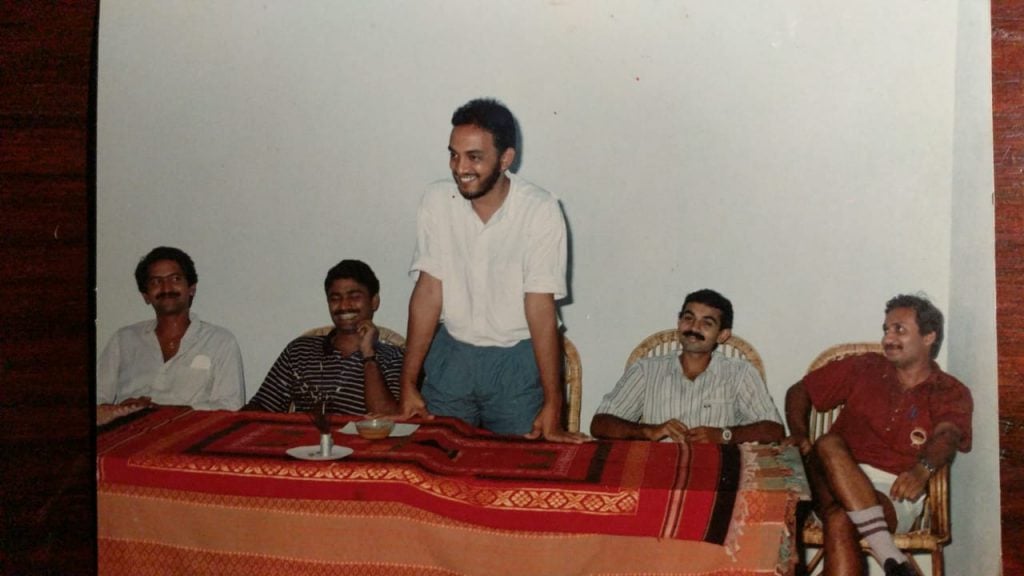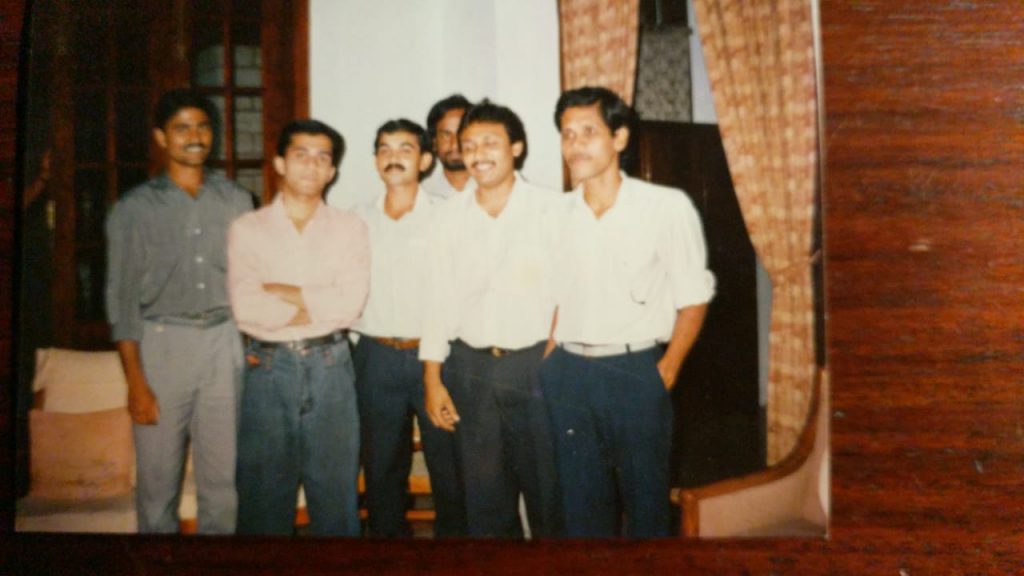
How to beat Goliath
Because size doesn’t matter
I have formulated 6 rules which I call David’s rules. These are for anyone facing the big one ...
Before I go to the third part of my strategy and tell you how that worked out, I would like to share with you two major learnings about dealing with unions.
One is the benefit of having one powerful union which represents all or the vast majority of your workers. This is something that is worth creating if it does not exist and to cherish and support when it does. I call it a benefit because in my experience this makes all dealings far easier than in a situation where there are multiple, equally matched unions, each trying to gain a few new members from their rivals. That leads to a lot of posturing and pseudo conflicts on minor issues as each union tries to prove how powerful and anti-management it is. And since you, the management, are the common target for all of them, your life becomes worthless. When there is one union, they have nothing to prove and tend to be more reasonable and willing to focus on the major issues and let the minor ones go by. In my sixteen years as a general manager, I have always supported the one union theory and have benefited from it.
Another benefit, contrary to popular opinion, is when the union is communist. I have always found the communists to be more ideologically committed than others, which usually means they are far less corrupt and easy to deal with. You always know where they stand on any issue and once you can convince them, they will ensure that they keep their end of the bargain. This is not the case with the other political party-based unions in India which are all highly corrupt, have no locus standi per se, and are always susceptible to being ‘bought out’ by someone. They change colors faster than a chameleon and are completely dishonest like the proverbial cat on the wall – you are never sure which way they will jump. Give me the communists any day.
In my entire career as a general manager, it is a matter of pride for me that I did not give a single paisa as a bribe to any union leader to get what I wanted. I always stood on principle and was able to win every single matter that went for arbitration simply based on good argument and principle in law. I must give a large part of the credit to the people I dealt with in the unions who were honest, upright politicians, ideologically committed to their party line and genuinely interested in doing good for their members. When they saw that I was also of the same bent of mind and did not want to exploit their members but wanted to run a profitable business, they eventually supported me and accepted my solutions. The path was rough, and the ride was bumpy, but we always arrived at our destination safely. The key is to show them how what you are proposing is good for everyone, all around. You cannot fool people. If you do, then your credibility will be permanently destroyed when they find out, which always happens. You must be honest and firm and have all your facts and be prepared to stand by your word.
The two major leaders in the Ambadi union, Mr. C. Perumal (General Secretary CITU) and Mr. Hemachandran Nair (President CITU), were people for whom I developed a lot of respect over the three years when I was the manager in Ambadi and dealt with them. I was most gratified that they too grew to respect me, and we formed a relationship that transcended our official roles of union leader and manager. Mr. Perumal who had been a union leader for over thirty-five years would on occasion call me to ask my opinion on some stance the union intended to take in a case on one of the neighboring estates. I once asked him why he was asking me, seeing that I was a manager.
He replied, “Because I respect your knowledge of labor laws and because you will not tell a lie and misguide me.” For me that was high praise, especially coming from the top leadership of the union.
On another occasion when we decided to lockout the estate in response to the union’s unscheduled strike, which I will talk about in detail later, I was walking in the factory and noticed two strangers following me. I turned around and asked them who they were. They said that they had come from the union office. I asked them what they wanted and why they were following me around the estate. They said that they had orders to do that from the General Secretary himself. I got very irritated with this as I considered it an infringement of my liberty. When I got back to the office, I called Mr. Perumal and asked him why he’d sent these people. His answer brought tears to my eyes.
He said, “Sir, you have declared a lockout. Then unlike all reasonable people who have left the estate for fear of violence you have decided to stay on, refusing to leave your staff on their own. Moreover, you have not allowed the police to interfere and have not allowed them to give you any protection or to arrest our people, even though we know that you have contacts at the highest level in the police. Finally, instead of sitting safe in your house you walk around the plant and estate to see if everything is alright. Sir, not every one of our people is like me. My fear is that there may be some stupid fellow who decides to attack you when you are alone. I do not want that to happen. We are against your policy in this issue, but we respect you as you are a man of principle and we like your way of working. So, I have deputed two of our people to guard you when you go out to make sure that nobody attacks you. That is why they were following you.”
I was speechless. All I could do was to thank him for his thoughtfulness. I had never heard of a situation where the union sends people to guard a manager who locked out their members when they went on strike. And that too a communist union. Such are the wages of sincerity.
To come to the last part of the turnaround strategy that I mentioned in the case of Ambadi, I borrowed from the wise general Sun Tzu’s principle of choosing the time and ground for your battle; it allows one to be in control of the situation as much as anyone can be.
I wanted to identify an issue that had enough emotive symbolic value to the union and workers so that when I won, the message would be clear. At the same time, a situation in which the union’s stance was so clearly unreasonable that it would not get the support of anyone in the official circles to which such disputes eventually go for arbitration.
I was extremely fortunate to have a situation that was almost made-to-order – the unscheduled General Body meetings. As I mentioned earlier, union leaders would come to the estate in the morning at muster time, hold long meetings, and make verbose speeches, delaying tapping and resulting in a loss of production. There were two major issues here. First was the issue of loss of production which hurt workers as well since they were paid an incentive on the amount of latex they collected. Late tapping reduces latex flow and so their incentive was also less on that day. However, they did not complain due to a misplaced sense of loyalty or peer pressure and the fear of displeasing union leaders and the management had been too weak to interfere. The other issue was more symbolic and powerful, the right of an outside union to enter the estate and hold meetings without the permission of the management, especially as this resulted in a measurable loss of production. In India we have two kinds of unions. One is the kind where workers form their own union and negotiate with management. They may have affiliation with a political party, but the members and office bearers are all registered workers of the business. They have an automatic right to enter the premises as they are working there. Another is an ‘outside union’ where the workers are general members and the office bearers are external influencers. In this case, the office bearers do not have an automatic right to enter the estate premises or to hold meetings. That was the issue here.
This was an issue of our right to manage as the owners of the business and for the union a matter of prestige at having done this without being questioned for more than twenty-five years according to their statement.
I started my initiative quietly, without fanfare. I collected data about the actual loss of production every time these meetings were held. This was clearly measurable, and we had records for a very long time. With these records, I met and explained the situation to the Labor Commissioner, the Superintendent of Police, the District Collector, and their assistants, with all of whom I had an excellent relationship. All three District Officers had a direct interest in the case as it affected labor and law and order. They were all equally surprised to learn about this situation where the union for all intents and purposes did what it wanted without any challenge even when it resulted in a loss of production and revenue.
I outlined my strategy to these people and told them that I expected that the union would fight as it was an issue of prestige for them. All of them promised their full support to me. The ASP (Assistant Superintendent of Police) Mr. Suryaprasad, offered to send a section of Armed Police to camp on the estate for my protection. I refused. I told him that the workers were my employees and I refused to treat them as a potential threat to me. He told me that there had been incidents of violence against managers in the district, including on Ambadi. But I refused to accept any police on the property.

I then called a meeting of the union and told them that I had no objection to their meetings provided they were done later in the day after the tapping task was finished and the workers were waiting for the latex to drip. I said that if the union agreed to this, then I would even host a lunch for all those who attended the meeting every time they had a meeting, even if it was every day. I also said that, in all fairness, the union should ask permission to hold these meetings as it was being done during working hours. The union flatly refused all these requests.
The President, Hemachandran told me, “We have been doing this for the last twenty-five years. Nobody tried to stop us from this ever. Now you want to stop this, and you tell us that we need your permission to enter the estate and talk to our workers?”
“Yes,” I said. “Legally, you know this as well as I do, that to stop work and hold a meeting during working hours, you need the prior permission of the manager. Otherwise, it amounts to striking work without notice for which there is a penal deduction of seven days’ wages.”
“So, you are threatening to deduct our wages?”
“I am not threatening Mr. Hemachandran. I am merely reminding you of the law. You are a lawyer yourself and you know the law better than I do.”
“We will see how you do this. We will not ask your permission. We will hold our meetings at the usual time whenever we like. And we will see what you can do.”
“So be it.” I said.
I then sent a formal notice to the union putting down my points in writing and copied it to the Commissioner of Labor for his information. I showed how we had been losing production because of these unscheduled meetings. I offered to allow the meetings as long as production did not suffer, and I reminded the union that failure to heed this notice would force me to take resort to the law as applicable. The union did not reply to the letter but the very next day Hemachandran came to the estate and held a three-hour meeting. Clearly, he wanted to take matters to a head. I was being tested. I immediately put out another notice warning of the consequences of such actions. The union’s response was to hold a meeting again the next day.
Meanwhile the tension on the estate was palpable. My staff on the one hand were afraid and on the other, excited at the prospect of engaging with the union with some self-respect for the first time in decades. I spoke to them and told them that we had the full backing of the company’s top management as well as the Government’s District Administration. The Labor Commissioner was also fully aware of what was going on and supported our strategy. All we needed to do was to stick to our position and we would win this issue. But CITU inspired fear and many of my staff were still afraid at the prospect of violence for which this area was known. To help alleviate their fear, I made it clear that I was with them physically and morally to the end. Many did not believe this until the day we locked out the estate and they saw that I was still there. This had a profound impact as it was the first time that they’d had a manager actually standing with them on the front-line as it were. My top management was also fully in the picture and supported me. Everyone understood that this was a make or break issue. There would be no backing down from either side. Either we succeeded and ran the estate on terms which were fair and legal or effectively gave up the our right to run our own company.
The next day I put out a warning notice to say that if the workers stopped work and attended any unauthorized meeting during working hours this would be treated as a strike without notice and seven days’ wages would be deducted as per the Payment of Wages Act. The union’s response was to call our bluff and they promptly held another meeting. I immediately put a wage deduction notice as I had promised to do. The tension increased.
The union had another meeting the following day. I instructed the staff to lock the muster and not issue latex buckets and knives if the workers did not collect them at the usual time. The workers were confused about the next course of action and accused us of preventing them from working. I responded and said that the working hours of the estate clearly indicated that work began at 6 a.m. and so if they came at 8 a.m. there was no work.
The next day to beat us at this game, they came at 6 a.m. collected the knives and buckets as usual and then instead of going to their tapping tasks, they gathered in the muster ground and Hemachandran spoke to them for two hours. After that they went to tap. I instructed the staff not to accept the latex they brought for weighing. My staff locked the weighing sheds and left. The workers were once again confused about what they were to do. The union advised them to leave the buckets with the latex in the sheds. Latex coagulates if left unattended, so the buckets were solid with congealed rubber scrap the next day. The workers said that they were unable to work as we had not collected their latex the previous day. I said that their work the previous day was theft as they had tapped on their own without our instructions and so we would not accept their production. As for the congealed latex, they were free to throw it away and come to work the following day at the right time. They refused and this went on for three days. On the third day the union struck work and we locked out the workers and put up a notice to this effect on the estate gates.
Now matters became really serious. I got death threats. Some workers sat at the estate gate in protest in a dharna (blockade). They made my effigy and were planning to burn it that evening. But Mr. C. Perumal got wind of it and immediately had it removed. He gave strict instructions that I was not to be abused personally and that there would be no slogan shouting against me personally. The Managing Director, Mr. Alagappan advised me to leave the estate with my wife and stay in Trivandrum in a hotel and monitor things from there. “I don’t want anything to happen to you both”, he told me. I told him that I would not leave my staff and my wife would not leave me. So, that was that. I invited my assistants to move into my house with their families, which they did and we actually had a lot of fun. The Assistant’s bungalows were far away from my bungalow and I didn’t want any of them to be targeted. We used to patrol the estate at night in case there was any attempt at vandalizing or theft. But nothing of that kind ever happened.

As I mentioned earlier, the Assistant Superintendent of Police offered to send a platoon of Armed Police for my safety, but I refused saying that I did not need police to defend me from my own workers. It was soon after this that the union leadership sent people to guard me as a precaution. There is a strange phenomenon in India that everyone knows what you have said to everyone else. So, my conversation with the ASP was public news. And it earned me a lot of respect.
It took another two weeks, but the matter came before the Labor Commissioner and he simply laughed in the face of the union and said, “Look, you people enjoyed yourselves all these years. That has come to an end. There is no case for me to adjudicate. You cannot just walk into the estate and stop work whenever you like. You know this as well as I do. So just forget the whole thing and go back to work.” And the union had no alternative but to follow this ruling.
The key learning for me was that despite the lockout and the decision against the union, there was minimal ill feeling because of the way we dealt with the whole situation. All the actions we took to ensure that we had built enough goodwill in all quarters now paid rich dividends. The fact that we’d picked an issue where the union was so obviously in the wrong, the fact that despite this we followed the law completely and in all respects, the fact that despite everything we treated people fairly, only strengthened our moral position.
The fact that I refused to use force even when I had a chance to do so and finally the fact that my staff and I refused to run away from the situation, all added to our prestige and ensured that when the workers came back to work, there was little or no ill feeling. Added to that was the fact that thanks to the enforced rest the rubber trees had due to the strike, we had a record crop that month and both the workers and the management team had little hardship as a result of the lockout.

Thanks to the kind of issue we picked to make our point and the way it ended, that was the first and last major conflict I had with the union. The rest of my tenure at Ambadi was as smooth as I could have wished for and gave me enough time to do a lot of plant and estate improvement that had long been overdue. I will not go into all the developmental work that I did on Ambadi as all those are known facts and have little relevance to the story here. Suffice it to say that I was able to bring my knowledge of tea technology to bear in the curing of rubber and introduced innovations in the factory for the first time in history. I also introduced improvements in safety and working conditions that not only enhanced productivity, but made the lives of workers easier and more pleasant.
Developing People
The biggest contribution that I was able to make was not even clear to me until almost my last day at the estate. My Factory Assistant Jayanand took me aside and said in his usual, quiet way, “I want to thank you because you taught me self-respect. You taught me that I could win. That I need not be afraid of anyone. That I could stand on my own feet. I want to thank you for this. I will never forget you.” For Jayanand, who was very introverted, that was a very long speech. For me it was a shock, albeit a very pleasant one. I was struck speechless. There was a lump in my throat and all I could do was to shake his hand. I was even more moved because, unbeknownst to him, when I was about to join as the manager at Ambadi, I was told by my boss that they wanted me to dismiss Jayanand because he was ‘useless.’
I had said to my boss, “I will make my own assessments. If you want to dismiss him, please do it. If I am to do this, then I will only do it if I see that, as necessary.” He agreed.
Jayanand was a rubber technologist and a very competent one at that. His only “problem” was that he was an incredibly quiet person by nature, a typical researcher who would have done very well in a research lab. For his luck, he was a manager in a factory staffed by some of the most rambunctious crowd of people you could ever find. So, he was thoroughly intimidated by the situation. On top of that, he did not get management support as his social and political skills were all limited and so it was easy for someone to brand him as useless. In my tenure I would sit and talk to him from time to time and always insisted that he should take whatever action needed to be taken in the factory with my full backing. If anyone tried to approach me directly, I would send them back to Jayanand. In due course, Jayanand started to flower and became one of my best Assistant Managers.
It was my way to ask for suggestions in our daily meetings and really focus on ensuring that people who gave a suggestion had taken the trouble to think it through. This ensures that people don’t simply talk ‘caz dey ga mout’ (because they have a mouth) as my Guyanese friends would say. And those who do talk say things that are workable.
So all our strategy in Ambadi got discussed and debated at these meetings. I held myself to the same condition and was open to being questioned. The only condition that I put and which was always honored by my team was that once a decision was taken at the meeting, then you fully supported it even if yours had been the only dissenting voice. We could not afford to have any misunderstandings among ourselves and so this rule was always adhered to. The same rule applied to the staff meetings. For some of the staff who had been in Ambadi for many years, this was their first experience at being heard and being able to influence the outcome of decisions. This experience is tremendously empowering, and it showed in the new energy that was visible among the staff. It also encouraged people to be thorough in what they proposed because it would be debated and if they had not done their homework, it would show. So, they took a lot of trouble to think things through and even tested hypothesis before actually putting a proposal through in the meeting.
Arun & Suresh took the lead in these meetings often and over a short time the others accepted them as their leaders. Arun Kumar Menon was the Assistant Manager when I took over Ambadi and stayed on at my request for some months to help me to settle in. Arun taught me all about rubber planting and Jayanand taught me about latex processing. I couldn’t have asked for better teachers. All the other Assistant Managers except Arun and Jayanand were new and so it was a great help to have Arun with me. Arun used to manage a satellite of Ambadi Estate called Greenham which was several kilometers away and came to Ambadi only for meetings every couple of days. But he was my link to Ambadi’s history and that was a particularly important link. It gave me joy to see that people would go to them instead of coming to me. And that he took the initiative to take decisions which traditionally were supposed to be the manager’s. As things came to a head and we eventually locked out the estate, Arun & Suresh were fully in the lead and were with me in all things, including our frequent consultations with the lawyers and the Labor Commissioner. Once we locked out, there was a time of waiting to see who would crack first. The matter was before the Labor Commissioner and we had to wait to be called for the arbitration meeting. At this time, I had to urgently go to Jaipur for a conference and left for about a week. Arun & Suresh were in charge.
As is bound to happen in all such situations, Murphy’s law kicked in and the Labor Commissioner who had not called us all the days that we had been waiting to be called, decided to call us, the day after I landed in Jaipur. This was in effect a test for me. I called them and asked what they wanted me to do. I could take the next flight and return to the estate, or I could take the risk of allowing them to lead the management delegation to the arbitration. I knew that they were fully aware of the entire situation and that they and I were totally in sync with the strategy and goals for the negotiation. I also had a high respect for their intelligence and communication ability. The real question for me was, “How much did I really trust them?” Or to put it in even more real terms, “How much did I really trust myself and whatever I had tried to teach them?” They being the helpful sort of course asked me this in so many words. I will never forget that conversation.
I asked them, “Are you guys confident that you can handle the negotiation before the Labor Commissioner?”
They replied, “Are you confident that we can do it?”
I said, “Let me ask Venky if he will agree to your leading the team.”
“Sure. Let us know.”
So, I called Venky. Venky was my boss, but more of a friend than a boss. It was a joy to work with the guy because he was always supportive of change and of developing people. The conversation went as follows:
“Venky, the Labor Commissioner has called us for the negotiations, and I am in Jaipur. I am confident that Arun and Suresh can handle the negotiations and so want to let them do it. I have spoken to them and they are willing. What do you say?”
“Yawar, as long as you believe that they can do it, I have no issues. After all it is your job that will be at stake isn’t it?”
“Yes Venky. You have been most helpful. Thank you very much.”
I called Suresh and told them, “I am not coming. You go ahead and attend the meeting. If you need to talk to me, call. I will back you fully.”
By the time I returned to the estate the following week the deed had been done and we had arrived at the Terms of Resumption settlement which was completely in our favor. I was delighted.
On my return I met them and asked how it went.
Their answer, “We did not sleep for the whole week.”
I asked them why they had not slept.
“Because we knew that if we failed, you would be the one to lose your job.”
On such incidents is the foundation of loyalty built.
Please log in to leave a comment
Loading comments...

I have formulated 6 rules which I call David’s rules. These are for anyone facing the big one ...

One of my friends who comes from ...
I have said this a million times, if I have said it once – the three crimes committed on society with society’s blessing are: Commerci...